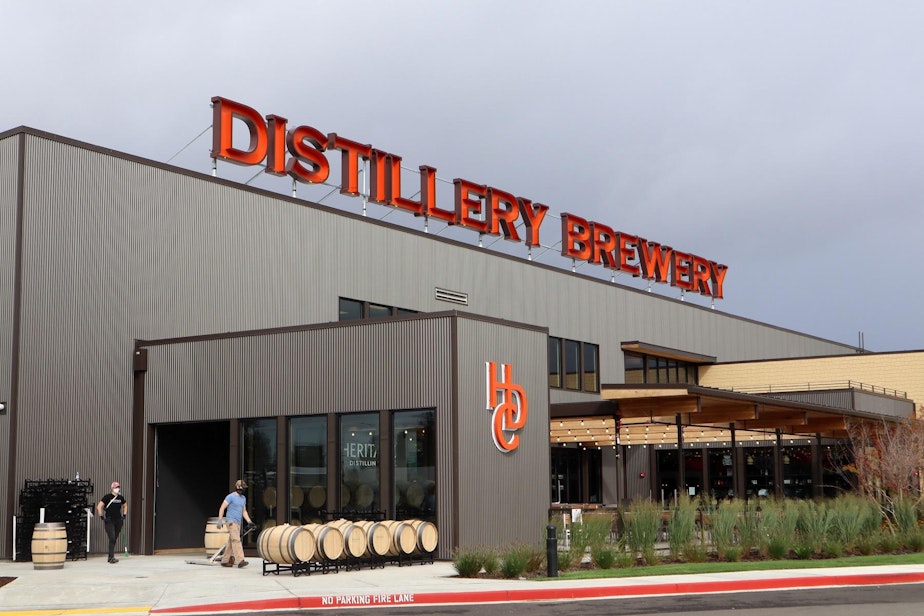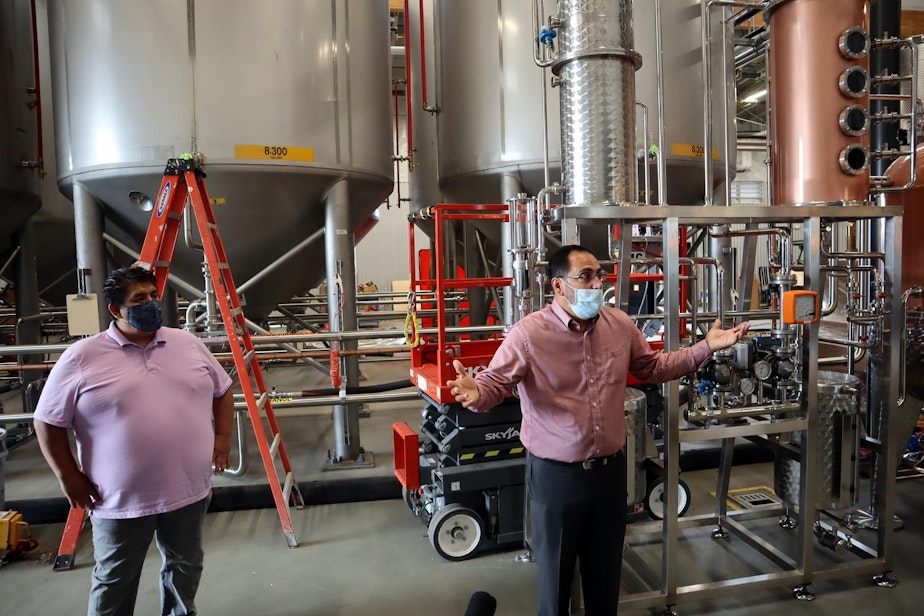Chehalis Tribe opens distillery after overturning centuries-old prohibition

A new distillery will soon begin making whiskey, vodka and gin on Chehalis tribal land in southwest Washington state. It's the first legal, Native-owned distillery to open on tribal land in the nation. The Chehalis Tribe's effort to diversify its economy by joining the craft spirits boom had to first overcome a nearly two century old prohibition on liquor production in Indian Country.
The new Talking Cedar brew pub and distillery rises just a block away from an Interstate 5 off-ramp between Olympia and Chehalis. Chehalis Tribal Enterprises CEO David Burnett showed off rows of two-story tall, stainless steel tanks and gleaming copper stills.
"This is a very large facility," Burnett noted during a tour on Thursday while adding, "I don't think this is going to end up being the second wave of casinos."
Liquor production in the airy, spacious facility is set to begin around year’s end after a final shipment of imported specialty parts arrives from Italy.
Tribal Chairman Harry Pickernell said the tribe's leadership hatched the idea for a craft distillery in 2015. They were brainstorming ways to enhance a hotel and planned restaurant to become a regional destination.
"We thought, why not a distillery," Pickernell said in an interview.
Sponsored

The tribe struck a partnership to produce spirits under the brand and guidance of Gig Harbor, Washington-based Heritage Distilling Company. Heritage makes the popular Brown Sugar Bourbon "BSB," among other drinks.
But then in 2017, the partners discovered their planned distillery would be illegal under federal law if built on tribal lands.
"We thought, where did this law come from?" Pickernell recalled. "When is it from? They said, '1834'. We said, 'Oh, my goodness sakes.'"
During President Andrew Jackson's administration, members of Congress banned liquor production in Indian Country. Congress acted, in their words, to "preserve peace on the frontier."
Sponsored
Pickernell and others lobbied to repeal the law. At the behest of the Chehalis Tribe, the 21st century Congress voted to remove the prohibition on alcohol distilleries on tribal land. Rep. Jaime Herrera Beutler (R-WA) sponsored the House bill, which President Donald Trump signed in December 2018.
That success would be just one of many challenges to overcome.
"I'm not sure I could create a more challenging set of circumstances to open a new business," Burnett said with a sigh while standing near a tangle of unconnected piping.
The delay at Congress meant this distillery was built in the midst of a trade war, which drove up steel prices, and then the coronavirus pandemic. So naturally, the first production run turned out hand sanitizer rather than whiskey.
With the pivot to hand sanitizer now done, the facility's focus is back on distilling and brewing. Sidenote: the top leaders overseeing this tribal enterprise are teetotalers themselves.
Sponsored
Democratic politician Hilary Franz, the Washington state lands commissioner, accepted an invitation to tour the facility during which she said the events of this year changed her preference for drinking wine.
"Covid hit. Wildfire season hit. And I will be honest, I've discovered whiskey. It's not bad, it's pretty good," she said while chuckling.
Franz volunteered to help make a new blend to be called "wildfire whiskey."
"Our tribal communities have been working hard throughout this state and this nation to help take care of their communities and they frankly had their hands tied behind their back in a very racist way that did not allow them to do what we have been able to do," Franz said, turning serious. "This is a win across the board."
Pickernell said tribal elders as well as youth voiced concerns about entering the alcohol business when the project launched. It can be a sensitive topic given that health researchers, including at the CDC, have long documented disproportionately high rates of alcohol-related deaths among Native Americans.
Sponsored
Pickernell said the issue was hashed out at a General Council meeting where all interested members of the tribe periodically gather to hear updates and discuss important matters.
"My assurance to them was that this is not to bring alcohol on the reservation, but just a means to diversify our economic ventures -- throughout not just the reservation, but nationwide and internationally, hopefully," Pickernell said.
Non-tribal entrepreneurs continue to apply for new craft distillery licenses in the Pacific Northwest, too. The pace of applications to the Washington State Liquor and Cannabis Board and Oregon Liquor Control Commission for new distilleries appears undamped by the pandemic.
The OLCC said it has received 18 applications for new distilleries so far this year. That compares to 16 applications during the same January-September periods in 2019 and in 2018.
The Chehalis Tribe is already fielding requests from other tribes for info about their trailblazing distillery and brewery.
Sponsored
"Any way that a tribe might have an interest in this, we are ready and able to talk to them about that," Burnett said.
A considerably smaller distillery started by a Native American couple opened in 2018 in northern Wisconsin on the sparsely-populated reservation of the Red Cliff Band of Lake Superior Chippewa. Copper Crow Distillery got a head start on craft distilling in Indian Country because the soon-to-be-repealed federal prohibition didn't apply to the family-owned land within the reservation where Copper Crow’s stills are located.
The combined brewery-distillery-restaurant opened by the Chehalis Tribe in Grand Mound, Washington, is projected to create around 130 jobs when it reaches full operation. The Talking Cedar facility offers around 280 seats for guests.
The Chehalis Tribe has more than 800 members. The tribe's other economic ventures include a casino, a hotel, three convenience stores, a construction company and a joint venture with Great Wolf Resorts to operate an indoor water park.

